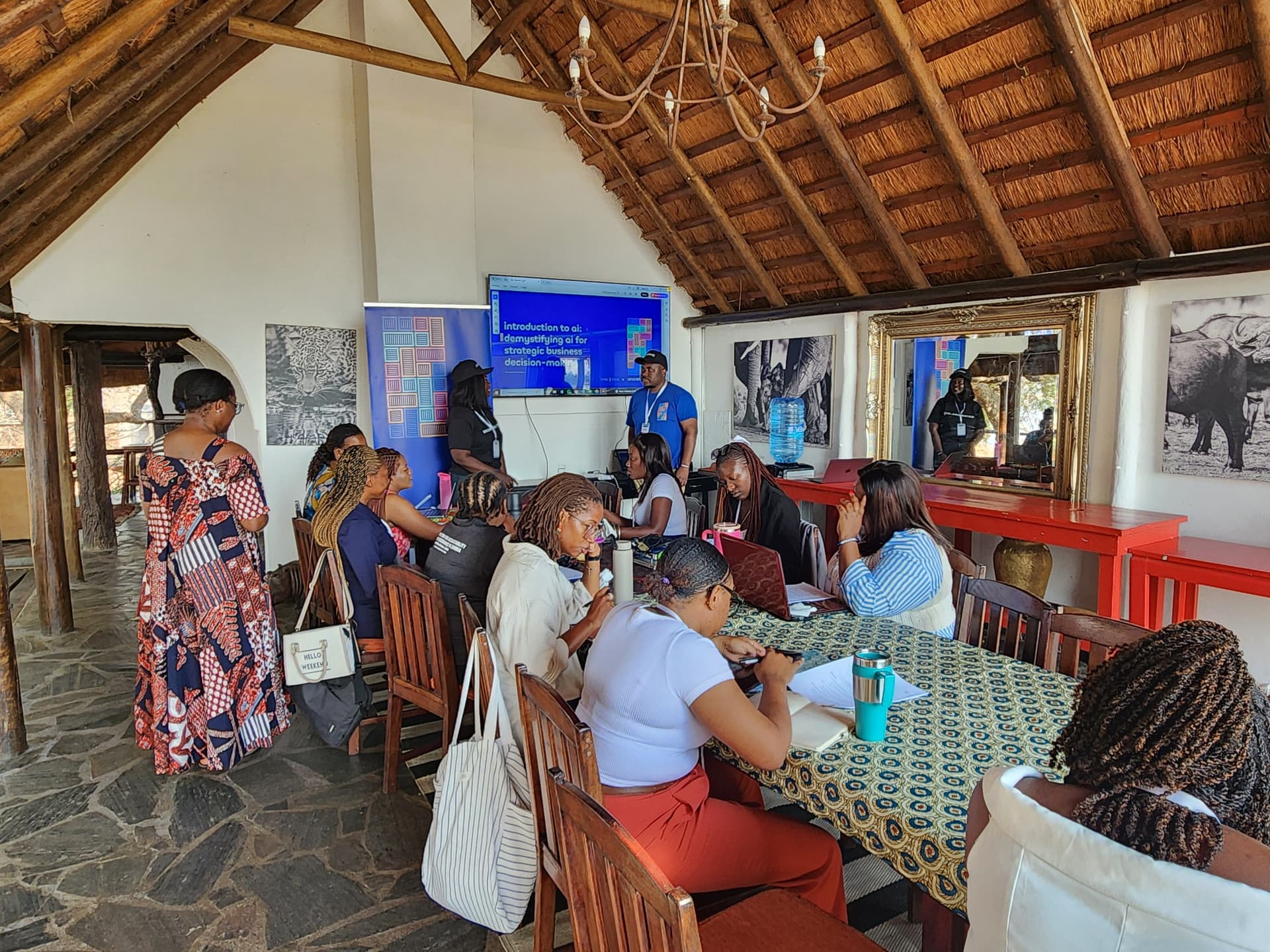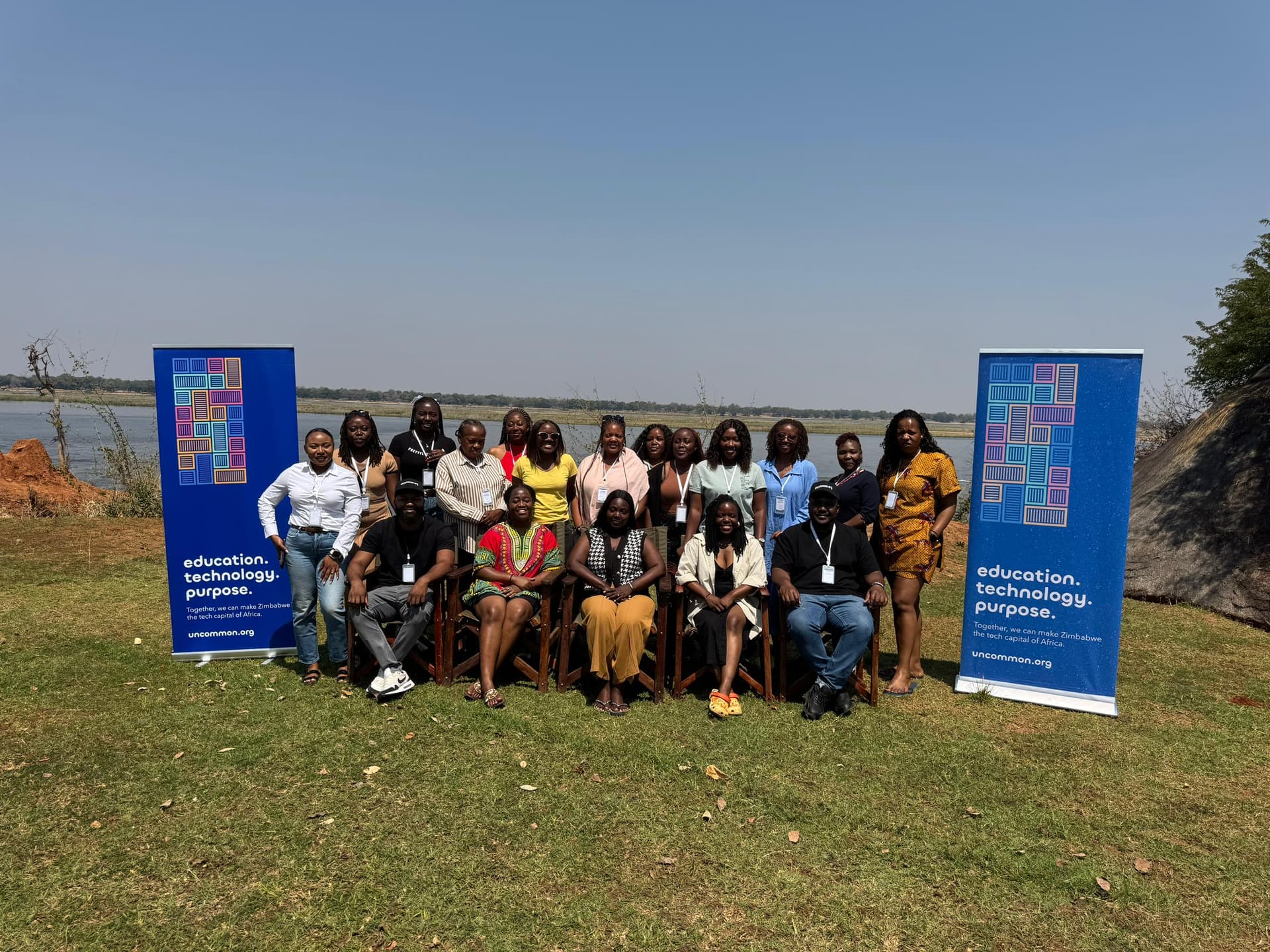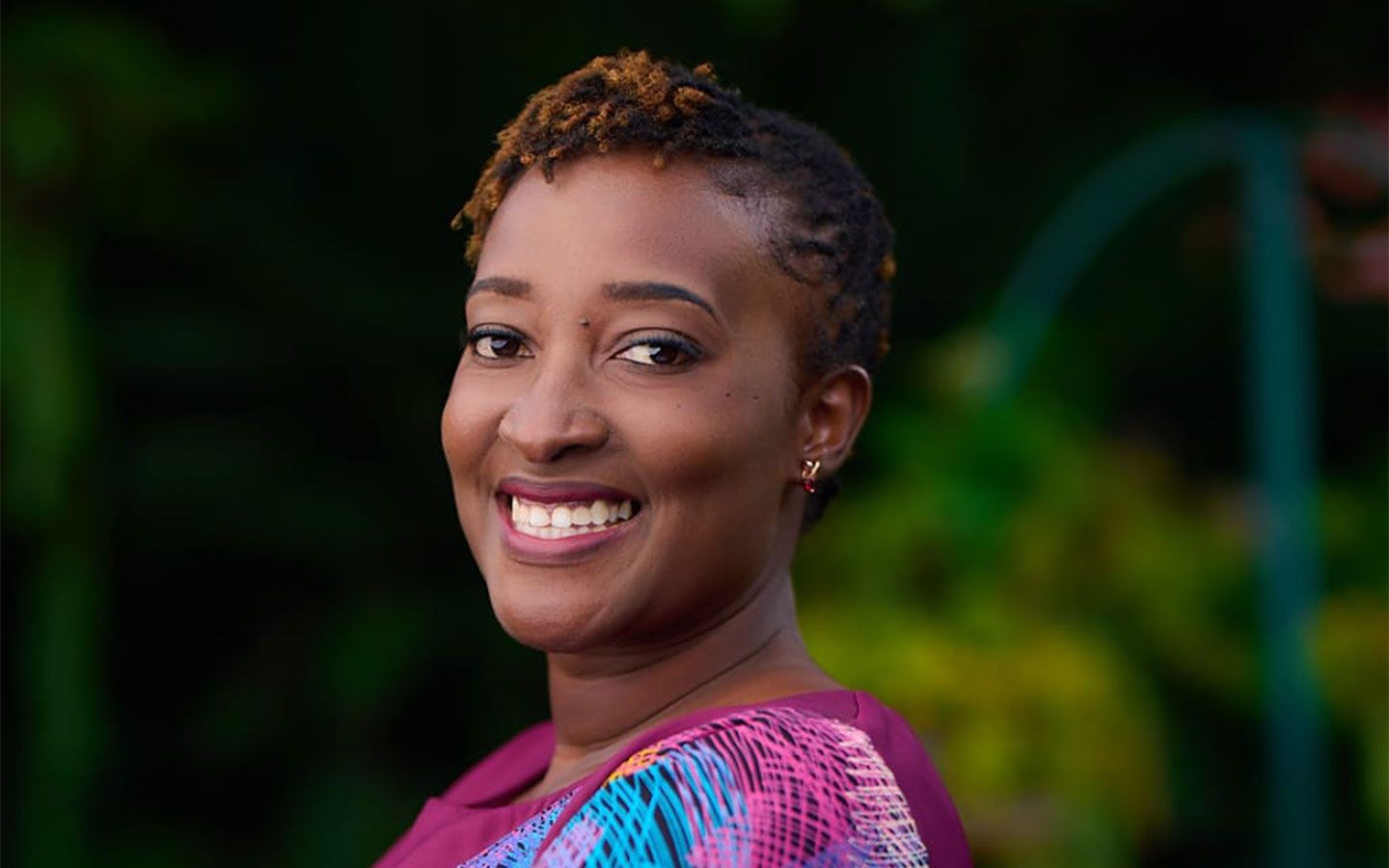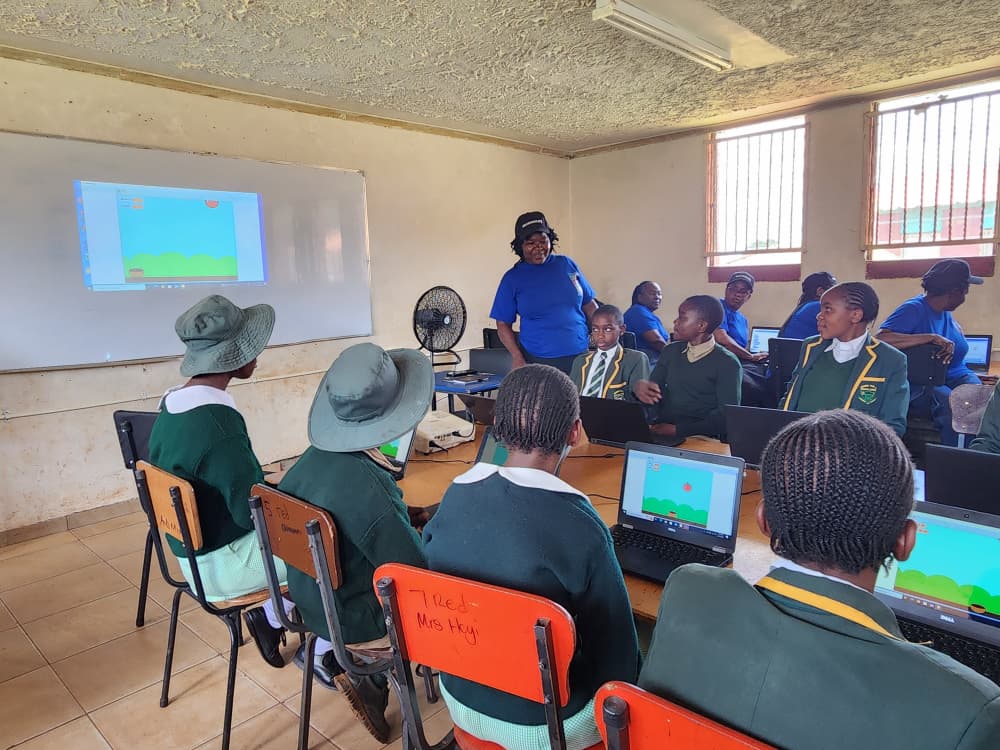
"Where was Uncommon all this time?"
This question, asked by one of our workshop participants on the final day, perfectly captures the transformation we witnessed at the Kasaka River Lodge in Lower Zambezi, Zambia. For three intensive days, we partnered with the Time + Tide Foundation to bring together incredible women from across various fields, healthcare, education leaders, NGO’s, and business leaders, all united by one thing: they wanted to understand how AI could genuinely help them lead better, not just add to their already overflowing plates.
Too often, AI training feels distant from real-world challenges. Workshops are often filled with technical jargon, complex coding examples, and tools that seem designed for Silicon Valley startups rather than the day-to-day realities of running a small business in Lusaka or analyzing data effectively.
We designed this program differently. We created it specifically for women leaders who wanted to harness AI's power without needing a tech background, just curiosity and a drive to lead with impact.
The participants who joined us came with varied levels of tech experience. Some were signing up for ChatGPT for the first time, while others were already power users looking to level up their skills. What they all shared was the challenge that many leaders face in Zimbabwe and Zambia: the fast-paced nature of technology and AI development, combined with uncertainty about which tools to leverage and how to understand the implications of data safety.
We started with the basics that matter, prompt engineering, understanding what AI can and can't do, and getting hands-on with tools they'd actually use. No jargon, no overwhelming tech speak, just practical skills they could apply immediately.
Before the session, participants weren't aware of prompting best practices. By the end of Day 1, their prompting had improved dramatically by applying prompt engineering frameworks, resulting in significantly better AI outputs.
Take Lucille, an Editor, Translator, and President of the Zambia Women's Writers Association. She arrived with only a basic understanding of AI tools but by the end of the first day had mastered ChatGPT fundamentals and understood the critical implications of data safety for her organization's sensitive literary work.

This is where things got exciting. We helped each participant map their daily challenges and design AI-powered workflows that could save them hours each week. Think automated report generation, smarter meeting prep, and streamlined team communications.
The biggest surprise came when we demonstrated how AI workflows work using Zapier. The room fell silent as participants realized they could automate tasks they'd been doing manually for years. You could almost see the mental calculations happening: "If I can automate this report that takes me three hours every week..."
Participants went through a personal workflow audit, identifying areas where AI could help them improve, then created their workflow prototypes. From report summarizing to data analysis, each woman built something tailored to her specific challenges.
The tool that had the biggest immediate impact was Gemini. Participants discovered how to use Gemini within Google Workspace to create everything from detailed project proposals to children's storybooks for their community programs.
Some remarkable before-and-after moments emerged:
Because powerful tools require thoughtful leadership, our final day focused on safe, responsible, and sustainable AI use. We covered everything from data privacy to bias awareness, ensuring our participants could implement AI responsibly in their organizations.
This wasn't just theoretical, we worked through real scenarios they'd face. How do you handle sensitive community data when using AI tools? What happens when AI gives you biased results about your target beneficiaries? How do you train your team without creating dependency on tools they might not always have access to?
By Day 3, the skeptical faces from Day 1 had transformed. These women were already implementing solutions and planning how to bring their teams along on the journey.
Behind this transformation was a carefully designed approach built on five core pillars:
Starting with the Basics: We began with universal skills like prompt engineering that work across any AI tool, ensuring everyone had a solid foundation regardless of their starting point.
Personalized Learning: Rather than generic demonstrations, we tailored examples to each participant's industry and specific challenges. A healthcare manager saw AI workflows for patient data analysis, while an education leader explored automated lesson planning.
Working with Familiar Platforms: Instead of overwhelming participants with completely new tools, we enhanced their existing platforms. We showed them AI features in Google Workspace that they didn't know existed, rather than forcing them to learn entirely new systems.
Building Independence: The most crucial skill we taught wasn't any specific tool; it was how to independently discover, test, and evaluate new AI solutions as they emerge. In a rapidly evolving field, this meta-skill matters more than mastering any single platform.
Staying Current: We equipped participants with resources and techniques to keep pace with AI developments relevant to their fields, creating a sustainable learning path beyond our three days together.

The real measure of success wasn't what happened during those three days, it was what participants planned to do next.
Each woman left with a personalized AI integration plan tailored to her specific role and challenges, plus a practical AI safety checklist she could share with her teams. But more importantly, they left with confidence and a clear vision of how to cascade this knowledge.
Participants understood that demonstrating AI's impact on their teams wouldn't require technical expertise, just showing practical applications that solve real problems. For those working in municipalities, the realization that better data collection and analysis could improve service delivery was particularly powerful.
The potential ripple effect across the communities they serve became clear as participants saw how AI could change entire organizational workflows if implemented correctly. When a healthcare manager can spend less time on administrative tasks and more time with patients, or when an education leader can quickly analyze student performance data to identify struggling learners, the impact extends far beyond the individual user.
This workshop perfectly embodies Uncommon.org's mission of teaching everyone, everywhere how technology changes lives. It's not enough to train only those who already have technical backgrounds; we need to reach the leaders who are actually making decisions and serving communities.
Our partnership with Time+Tide Foundation represents everything we believe in: that when we empower leaders with the right tools and knowledge, the ripple effects reach entire communities. The foundation's commitment to conservation and community development aligned perfectly with our vision of technology as a force for positive change.
The immediate response was overwhelming. Participants requested online follow-up sessions to review their implementations and get support as they introduce AI to their organizations. This wasn't just polite enthusiasm; these women had work to do, and they wanted to do it well.
We measured success not just through participant feedback, but through actual implementation: prompt engineering application, data analysis projects, presentation creation, and the quality of plans they developed for their teams.
Creating this curriculum required breaking down complex concepts into simpler, more accessible ideas while ensuring no participant would be left behind. We built workflows based on participants' current work processes rather than theoretical scenarios.
The unexpected challenge of varied AI exposure levels, from complete beginners to power users, actually became a strength. Advanced users helped mentor newcomers, while beginners asked questions that helped everyone think more clearly about fundamental concepts.
Sometimes the most important conversations happen when brilliant people get together in beautiful places to learn something new. This was definitely one of those times.
But beyond the setting and the camaraderie, this workshop proved something crucial: AI literacy isn't just for technologists. It's for anyone who wants to lead more effectively, serve their communities better, and multiply their impact.
When Lucille asked, "Where was Uncommon all this time?" she wasn't just expressing gratitude for the training. She was recognizing that this kind of practical, accessible AI education should be available everywhere, for everyone who has the drive to learn and the desire to lead with impact.
That's exactly what we're working to create, not just in Zimbabwe and Zambia, but wherever leaders are ready to embrace technology as a tool for positive change.
The AI for Women Leaders Workshop was made possible through our partnership with Time+Tide Foundation. To learn more about bringing similar training to your organization or community, contact us at hello@uncommon.org.

We sat down with our Country Director, Michelle Gwatiringa and had a conversation about th...

In 2020, in the middle of a global pandemic, something quiet but powerful began at Warren ...

For nearly three years, I lived alone, paying rent, sometimes eating, sometimes going with...